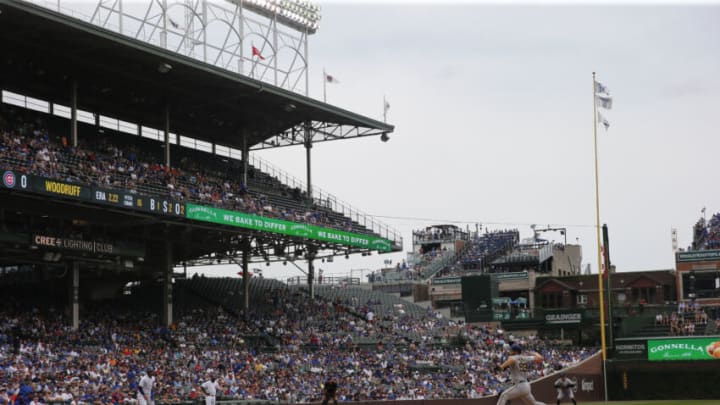For the better part of the last decade, at least until COVID-19 slammed its doors shut to Chicago Cubs fans, Wrigley Field was filled to the brim with fans on gameday. The historic stadium and Wrigleyville, at large, including the rooftops, local bars and restaurants and the Ricketts-owned Hotel Zachary were packed – and the dollars poured in, especially following the team’s surprise NLCS run in 2015.
The very next year, the unthinkable finally happened. The Cubs won it all and the team formerly known as the Lovable Losers had never been more popular, breaking a 108-year championship drought, the longest in the history of American sports. But since 2016, the team has gone downhill little by little until finally, Jed Hoyer sold off the final marquee names from the most successful era in franchise history.
More from Cubbies Crib
- Cubs should keep close eye on non-tender candidate Cody Bellinger
- Cubs starting pitching has been thriving on the North Side
- Make no mistake: the Cubs are very much about power hitters
- Cubs are giving pitcher Javier Assad a deserved shot
- Cubs: It’s time to start thinking about potential September call-ups
Fans had their hearts ripped out when Anthony Rizzo was shockingly traded to the New York Yankees, followed by a flurry of moves that sent Kris Bryant, Javier Baez and Craig Kimbrel to contenders – all but guaranteeing a depressing, uninspiring final two months at the Confines.
Since that fateful trade deadline, attendance has dropped rather precipitously – falling further and further with each additional loss. Chicago is now a whopping 23 games out of first place, 17 games below .500 on the year. The end result should surprise no one.
Monday night’s game, with the Colorado Rockies in town, marked the lowest paid attendance at Wrigley Field since 2014. In fact, the Cubs have an average of 23,341 per game at Wrigley in 2021, down from 38,208 in just 2019. Of course, we have to keep in mind there were attendance caps in place early in the year, which definitely has a big impact on those numbers.
But lately, you don’t need to dig into spreadsheets and data to see the impact the fire sale has had on attendance. A franchise-record 13-game home losing streak, paired with a Triple-A roster taking the field every day has culminated in a sea of empty green seats on broadcasts near-daily.
The Cubs still boast – by a pretty wide margin – the most expensive prices in baseball. And fans have had enough. If you’re not going to field a competitive team and you keep making it harder and harder for fans to afford to come to the park regardless, this is what you get. And it serves ownership right.
Chicago Cubs: The fans have the power to force Ricketts’ hand
The fans are the heartbeat of the Chicago Cubs organization. Without them, this team is not the fourth-most valuable in baseball. They’re quickly forcing Tom Ricketts to understand a hard truth: now that winning has become the norm, there is no acceptable alternative. We want winning baseball.
Being worth over $4 billion, there really is no excuse the Cubs aren’t winning and buying at every deadline and offseason. Though player salaries are admittedly more expensive than ever before, no fans in attendance last year alone cost the Cubs $179 million in estimated revenue. Simply put, if fans can unite and not stand for Ricketts putting a poor product on the field, he will have no choice but to make the team better in order to fill the seats at Wrigley.
At the end of the day, the people who helped Ricketts rake in cash hand-over-fist during the team’s recent run are the same ones who can hold his feet to the fire now. Take a stand and show that as a diehard fan base, we do not and will not stand for his crying poor act any longer.
To be fair, it’s not like the Ricketts have never spent any money to try to improve the team. Chicago signed Yu Darvish to an expensive deal and ownership ponied up the money mid-season back in 2019 to sign Craig Kimbrel. But there are countless other instances where the front office failed to supplement the core, as well.
If the core truly was dismantled because Hoyer felt that group had run its course and no longer provided a legitimate chance to win, so be it. That means this winter is the time to see if Ricketts used the core as a scapegoat to save a few bucks, or if they really intend to win again soon.
In any case, the more the fans take a hiatus from Wrigley, the more Ricketts has to take notice and, hopefully, he understands there’s just one thing to do: spend heavily on revamping the roster in free agency this offseason.
